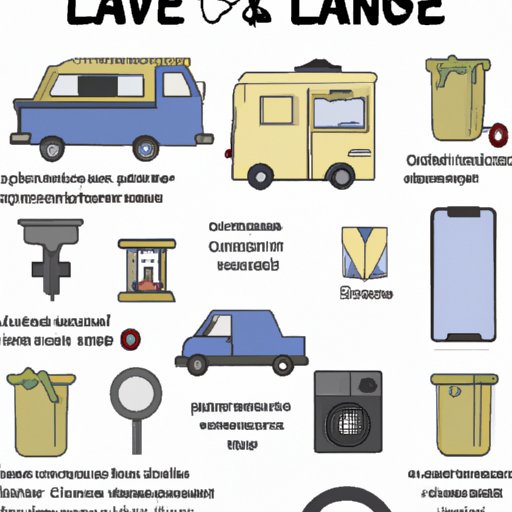Introduction
Living the van life is an increasingly popular way of life that offers freedom and flexibility to explore different places, cultures, and experiences. It’s not always easy, but with the right preparation and planning, it can be an incredibly rewarding lifestyle. This article will provide practical tips and advice for those looking to live in a van and travel.
Research the Laws and Regulations in the Areas You Plan to Visit
Before you set off on your journey, it’s important to do some research into the laws and regulations in the areas you plan to visit. Every state or country has its own laws and regulations regarding van life and camping, so it’s important to be aware of these before you get there.
Understanding Local Laws
The first step is to understand the local laws regarding overnight parking and camping. Some areas may have specific laws against overnight parking in certain locations, while others may allow it in designated areas. Be sure to check the local laws and regulations before you arrive to ensure that you are following them.
Knowing What’s Allowed and Not Allowed
It’s also important to know what type of activities are allowed and not allowed in the area you plan to stay. For example, some states may require a permit for campfires while others may prohibit them altogether. Additionally, some areas may restrict the amount of time you can stay in one place, so be sure to check the local laws before setting up camp.
Exploring Different Types of Camping Options
Finally, it’s important to explore the different types of camping options available in the area. Many cities and towns offer public campgrounds, RV parks, and dispersed camping sites where you can park your van and stay for a period of time. Additionally, some areas may offer boondocking on BLM land which is a great option for those who want to stay in more remote areas.
Prepare for Essential Supplies & Services
Once you’ve researched the laws and regulations in the areas you plan to visit, it’s time to start preparing for your trip. This includes stocking up on essential supplies and services such as food and water, gas and electricity, toiletries and hygiene items, clothes and shoes, and other essentials.
Food & Water
Stocking up on food and water is essential for living in a van and traveling. You should have enough food and water to last at least a few days so you don’t have to worry about running out while you’re on the road. It’s also a good idea to bring along non-perishable items such as canned goods and dehydrated meals in case you’re unable to find food in the area.
Gas & Electricity
You’ll also need to make sure you have enough gas and electricity to power your van. If you’re staying in an RV park, you’ll likely have access to both, but if you’re boondocking, you may need to invest in a generator or solar panels to keep your batteries charged. Additionally, you may want to consider investing in a portable propane tank for cooking.
Toiletries & Hygiene Items
Be sure to stock up on all your necessary toiletries and hygiene items. This includes things like soap, shampoo, toothpaste, and toilet paper. You’ll also want to bring along any medications you may need, as well as any first aid supplies.
Clothes & Shoes
Finally, you’ll need to pack enough clothes and shoes for your trip. Be sure to bring items that are comfortable and appropriate for the climate you’ll be visiting. Additionally, it’s a good idea to bring rain gear and layers in case the weather changes unexpectedly.
Other Essentials
You should also pack any other essentials you may need such as a flashlight, maps, a GPS device, and a toolkit. It’s also a good idea to bring along a few books or magazines for entertainment during your travels. Additionally, if you plan to explore hiking trails or other outdoor activities, be sure to bring along the necessary equipment.

Invest in Quality Gear to Make Life Easier
Investing in quality gear can make life much easier when living in a van and traveling. It’s important to invest in items that are durable and reliable so they can stand up to the rigors of the road. Here are some of the most important pieces of gear to consider investing in.
Home Improvements
Making improvements to your van can make it more comfortable and livable. This could include things like insulation, curtains, and storage solutions. Additionally, you may want to invest in a mattress or sleeping pad to make sleeping more comfortable.
Cooking Equipment
Having the right cooking equipment can make mealtime easier and more enjoyable. Investing in a small stove and cookware can help you whip up delicious meals no matter where you are. Additionally, you may want to consider investing in a small cooler to store perishable items.
Sleeping Accessories
There are many sleeping accessories that can make life on the road more comfortable. Investing in a sleeping bag, pillow, and blankets can help you get a good night’s sleep. Additionally, you may want to consider buying earplugs and an eye mask to block out noise and light.
Electronic Devices
Having the right electronic devices can make life on the road much easier. Investing in a laptop or tablet can help you stay connected to the outside world. Additionally, you may want to consider buying a portable Wi-Fi hotspot to stay connected while you’re on the move.
Find Van-Friendly Camping Spots
Now that you’ve stocked up on supplies and invested in quality gear, it’s time to find van-friendly camping spots. There are many different types of camping spots available depending on your needs and preferences.
Public Campgrounds
Public campgrounds are a great option for those who want to stay in a more developed area. These campgrounds typically offer amenities such as bathrooms, showers, and laundry facilities. Additionally, some campgrounds may offer additional activities such as swimming or fishing.
Boondocking on BLM Land
Boondocking on BLM land is a great option for those who want to stay in more remote areas. This type of camping is free and unrestricted, but it’s important to follow the rules and regulations of the area. Additionally, you may need to bring your own water and other amenities.
Dispersed Camping
Dispersed camping is another option for those who want to stay in more remote areas. Dispersed camping is free and unrestricted, but it’s important to follow the rules and regulations of the area. Additionally, you may need to bring your own water and other amenities.
RV Parks
RV parks are another option for those who want to stay in more developed areas. RV parks typically offer amenities such as bathrooms, showers, and laundry facilities. Additionally, some parks may offer additional activities such as swimming or fishing.
Practice Good Hygiene & Waste Management
It’s important to practice good hygiene and waste management while living in a van and traveling. This includes keeping clean, storing trash properly, and managing waste responsibly.
Keeping Clean
It’s important to stay clean while living in a van. This includes showering regularly, brushing your teeth, and washing your hands often. Additionally, you may want to invest in some cleaning products to keep your van clean and organized.
Storing Trash
It’s important to store trash properly to keep your van and campsite clean. Invest in a trash can with a lid to keep animals and insects away from your garbage. Additionally, you should never leave your trash behind when you leave a campsite.
Managing Waste
Finally, it’s important to manage waste responsibly. Invest in a compost bin to reduce your waste and minimize your impact on the environment. Additionally, you should never dump your waste in public areas or leave it behind when you leave a campsite.
Make Friends & Connect with the Local Community
Making friends and connecting with the local community is an important part of living in a van and traveling. There are many ways to meet locals and make connections, such as joining groups, making connections online, and participating in local events.
Joining Groups
One of the best ways to meet people and make connections is by joining groups. Look for local Facebook or Meetup groups in the areas you plan to visit and join them. This is a great way to connect with locals and learn more about the area.
Making Connections
Another way to make connections is by reaching out to people online. Join forums, post in Facebook groups, or use apps like Couchsurfing to connect with locals and get tips about the area. Additionally, you can ask around in the local community for recommendations and advice.
Participating in Local Events
Participating in local events is a great way to meet people and experience the culture of the area. Look for festivals, concerts, markets, and other events in the area and attend them. This is a great way to get to know the locals and experience the area in a unique way.
Conclusion
Living the van life can be an incredibly rewarding lifestyle. With the right preparation and planning, you can enjoy the freedom and flexibility of life on the road. Research the laws and regulations in the areas you plan to visit, prepare for essential supplies and services, invest in quality gear, find van-friendly camping spots, practice good hygiene and waste management, and make friends with the local community.
(Note: Is this article not meeting your expectations? Do you have knowledge or insights to share? Unlock new opportunities and expand your reach by joining our authors team. Click Registration to join us and share your expertise with our readers.)

Really useful article. Thank you. We’ll link to it from our motorhome blog.